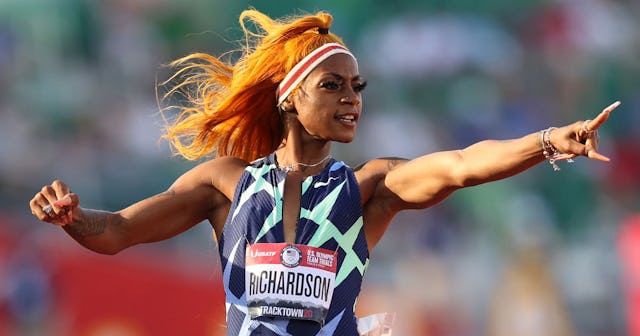Sha'Carri Richardson Will Miss Olympics After Positive Cannabis Test

Olympic team officials declined to place Richardson on the relay team
Sha’Carri Richardson will not be heading to Tokyo for the Olympic games. USA Track and Field announced the roster for the summer games, and the sprinter was not named for the women’s 4x100m relay race — the only event she could have competed in after she tested positive for marijuana at the trials in Oregon on June 19.
Some took to Twitter to vent about the optics of suspending Richardson for marijuana use as more states legalize recreational use.
Others thought it was… well… interesting that Richardson faces more consequences than some who participated in the January 6 riots in Washington, D.C.
In June, Richardson’s time of 10.86 seconds in the 100m trials was disqualified after she failed a drug test. She accepted a one-month suspension and was placed on provisional suspension. The suspension would have ended just before the Olympic 4 x 100 event, making her eligible to compete. (The event takes place on August 4 and 5).
“Richardson’s period of ineligibility was reduced to one month because her use of cannabis occurred out of competition and was unrelated to sport performance, and because she successfully completed a counseling program regarding her use of cannabis,” the U.S. Anti-Doping Agency (USADA) said in a statement. “Beyond the one-month sanction, athlete eligibility for the Tokyo Games is determined by the USOPC and/or USA Track & Field eligibility rules.”
The World Anti-Doping Agency (WADA) and the USATF consider marijuana to be a prohibited substance, People reports. The World Anti-Doping Agency says cannabis is problematic for athletes, has the potential to enhance performance and infringes on the spirit of sport. (It’s important to note that recreational cannabis use and possession are legal in Oregon, where Richardson tested positive).
The USATF released a statement explaining their decision to not include Richardson on the Tokyo roster.
“First and foremost, we are incredibly sympathetic toward Sha’Carri Richardson’s extenuating circumstances and strongly applaud her accountability – and will offer her our continued support both on and off the track. While USATF fully agrees that the merit of the World Anti-Doping Agency rules related to THC should be reevaluated, it would be detrimental to the integrity of the U.S. Olympic Team Trials for Track & Field if USATF amended its policies following competition, only weeks before the Olympic Games,” the statement said. “All USATF athletes are equally aware of and must adhere to the current anti-doping code, and our credibility as the National Governing Body would be lost if rules were only enforced under certain circumstances.”
“So while our heartfelt understanding lies with Sha’Carri, we must also maintain fairness for all of the athletes who attempted to realize their dreams by securing a place on the U.S. Olympic Track & Field Team,” the statement continued.
One fan tweeted their frustration with the process.
After the announcement of the team roster, Halle Berry tweeted in support of Richardson.
On July 2, Richardson spoke about her suspension on the Today show, telling co-host Savannah Guthrie she used marijuana to cope with the death of her biological mother, who died the week before the track trials.
“People don’t understand what it’s like to have to — alright, people do. We all have our different struggles. We all have our different things we deal with,” said Richardson. “But to put on a face, to have to go in front of the world and put on a face and hide my pain, I don’t know … Who am I to tell you how to cope when you’re dealing with pain? Or you’re dealing with a struggle that you’ve never experienced before? Or that you never thought you’d have to deal with?”
Richardson tweeted fans after news of her failure to make the team went public.
In the Today interview, Richardson discussed how hard it was to show up on the track and compete while being in a “state of emotional panic” after learning of her biological mother’s death. The athlete said she felt “blinded by emotions” and “sadness,” adding, “I was trying to hide my pain.”